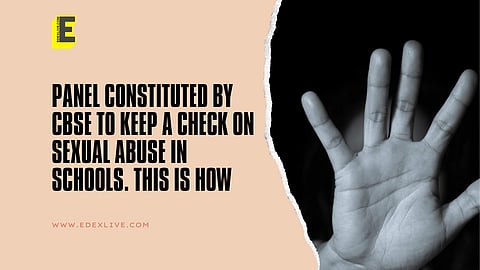

In a major move to check the sexual abuse of students in schools, an expert committee, constituted by the Central Board of Secondary Education (CBSE) to deliberate on issues pertaining to prevention-oriented programmes on sexual abuse in the school curriculum, has mandated that students, teachers and staff of schools be sensitised to understand what sexual abuse is, the signs and consequences of abuse and how to report it.
"It is essential for schools to create a culture where students feel comfortable reporting incidents of sexual abuse. This can be achieved by promoting an environment where students feel safe and valued, and by providing confidential reporting mechanisms for students. The schools should thoroughly screen and train staff members in recognising and reporting sexual abuse. Ongoing training and professional development should be provided to staff to help them stay up to date on latest policies, procedures and best practices for preventing sexual abuse," a report by the committee said.
The panel is headed by Dr Rajesh Sagar, MD, child and adolescent psychiatry, All India Institute of Medical Sciences, New Delhi.
Complex issue, multi-pronged approach
The report, accessed by TNIE, says preventing sexual abuse in schools is a complex issue that requires a multi-pronged approach. "It is important for students, teachers and staff to understand what sexual abuse is, the signs and consequences of abuse and how to report it," the committee said.
The report stated that following the recommendations of POCSO (Protection of Children from Sexual Offences) and the JJ (Juvenile Justice) Act, the guidelines published by the National Commission for Protection of Child Rights (NCPCR), and the Union ministry of education mandated that all schools should have clear policies and procedures in place for responding to incidents of sexual abuse, including reporting mechanisms, investigations and support services for survivors. These policies should be reviewed regularly and communicated effectively to the school community.
Schools can implement age-appropriate sexual abuse education programmes, and regularly conduct training and workshops for all members of the school community. The committee recommended that sensitisation for students, parents and schools may be taken through different modules or manuals which specifically address various stakeholders like the teacher training module, an advocacy manual for school principals, the peer-to-peer module and parents' and families' guidebook.
Promoting awareness
In the literature review of studies, it was revealed that there existed a statistically significant relationship between the high level of knowledge and attitude of adolescents and the reduction of risk factors and sexual assault. Hence, promoting awareness and attitudes through evidence-based interventions can prevent sexual abuse in adolescents.
Doctors, nurses and other medical professionals can play a crucial role in delivering prevention of sexual abuse messages to young children. Community organisations, such as youth groups, sports teams and religious organisations, legal experts can be effective channels for delivering messages to youth.
The committee further stated that mobile apps can be an effective way to deliver prevention-of-sexual-abuse messages directly to youth. These apps include educational games, quizzes, and interactive activities.
